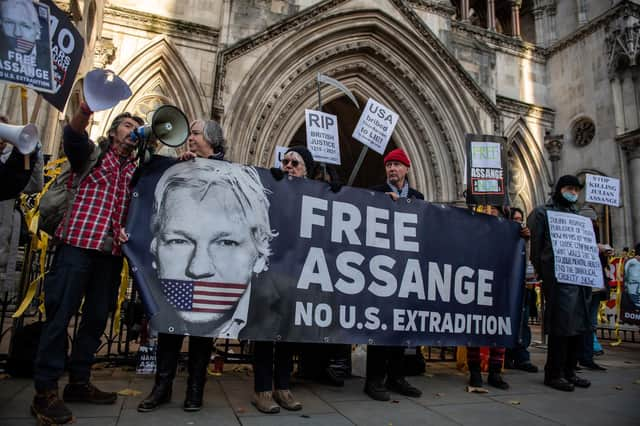Julian Assange: Why UK courts considering extradition are not addressing the most important question in the case – Dr Paul Arnell


Yet, in spite of their length, they have not addressed what many feel is the most important question.
The upcoming appeal at the High Court in London will consider issues closer to heart of the matter. Such is the nature of the law, however, it will not tackle them head-on. It will not consider whether Assange deserves to be extradited to stand trial in the United States for what he did.
Advertisement
Hide AdAdvertisement
Hide AdHome Secretary Priti Patel approved Assange’s extradition on June 17. Wikileaks subsequently said in a statement that her decision was not the end of the fight, but rather only the beginning of a new legal battle. That is undoubtedly the case. Under the law, Assange is entitled to appeal that decision and previous findings against him.
Extradition law does not oblige courts to consider whether it is just or right to transfer a person to stand trial in another country. The process is somewhat like criminal trials, but not in the sense of addressing the central question. In a criminal trial, the question facing the court is not whether the accused committed the crime. Rather, it is whether the prosecution established beyond reasonable doubt that he did so. These are two different things.
In extradition law, courts do not consider whether extradition is just. Rather they decide whether certain criteria and bars to extradition are met. The rules are found in the Extradition Act 2003. The presumption is that extradition will take place if the criteria are met. Treaties between the UK and its partners are concluded for that purpose. Generally, only where specific arguments, or bars, to the process are established is a request refused.
Assange was successful in resisting extradition on the basis of his mental health at his original extradition hearing. The Magistrates’ Court held that it would be oppressive to extradite him after hearing evidence from experts in mental health. That decision was overturned following a US appeal. It was held that the assurances that the US had given effectively met the concerns over Assange’s mental health. Subsequently, the Supreme Court refused leave to appeal and Patel approved his extradition.
One consequence of these earlier proceedings is that subjects closer to the heart of Assange’s case will be aired in his upcoming appeal. These are whether his right to freedom of expression is sufficiently important to bar his extradition, and whether the US request for him was motivated for reasons of his political opinions. Regrettably, a question even closer to the crux of the matter, whether the US is seeking him for a political offence, will not be considered.
The right to freedom of expression protects the ability to receive and impart information without restriction. This is of particular relevance to journalists. It is what they do. The National Union of Journalists, amongst other organisations, has been vocal in its support for Assange for precisely these purposes. His extradition, it argues, would send a message that journalists and publishers are at risk whenever their work disquiets or embarrasses the US.
The freedom of expression is not unqualified, however. Incitement of racial hatred and various pornography-related offences, for example, restrict one’s freedom of expression.
As do crimes within the UK’s Official Secrets Acts 1911-1989. Assange’s lawyers will argue that extraditing him for sharing information is a disproportionate interference with his right to freedom of expression. Lawyers for the US, on the other hand, will say that interfering with his right in the circumstances is lawful for reasons of national security.
Advertisement
Hide AdAdvertisement
Hide AdAssange’s lawyers will most likely also argue at the High Court that he should not be extradited because the US is wishing to prosecute him on account of his political opinions, and that his trial may be prejudiced on account of them. Lawyers for the US will counter this by arguing that Assange is sought for trial of the offences he is accused of and nothing else, and that US law protects the right to a fair trial.
These two arguments come close to considering whether Assange’s extradition is just. But not close enough. His lawyers cannot argue that he is being sought for offences of a political character.
A rule of UK law giving this protection existed until 2004. However, it was removed as part of the efforts to address international terrorism. The rule, the political offence exception, does exist in the UK-US extradition treaty, but UK courts apply domestic not international law.
Had the political offence exception existed, Assange could have had made a fairly strong argument on that basis. His motivation was not financial, nor did he intend to inflict harm upon the US. As the law stands, however, Assange’s motives are irrelevant. His supporters believe they are crucial.
The Assange case provides weighty support for a reconsideration of aspects of extradition law and practice. The reintroduction of some form of political offence exception is at the forefront of them.
Other cases, such as Spain’s request for Clara Ponsati and India’s for Vijay Mallya, may well have seen arguments on that basis. Other subjects for reform highlighted by the Assange case are length of proceedings, the denial of bail and the procedure, substance and trustworthiness of assurances given by requesting states.
A review of extradition law will come too late for Assange, his family and supporters. The arguments made in his upcoming appeal must be based on the law as it stands. What many feel to be the most important of questions arising in his case will not be directly addressed in a UK court. That is, simply, whether what Assange did was wrong and merits punishment.
Dr Paul Arnell, Law School, Robert Gordon University
